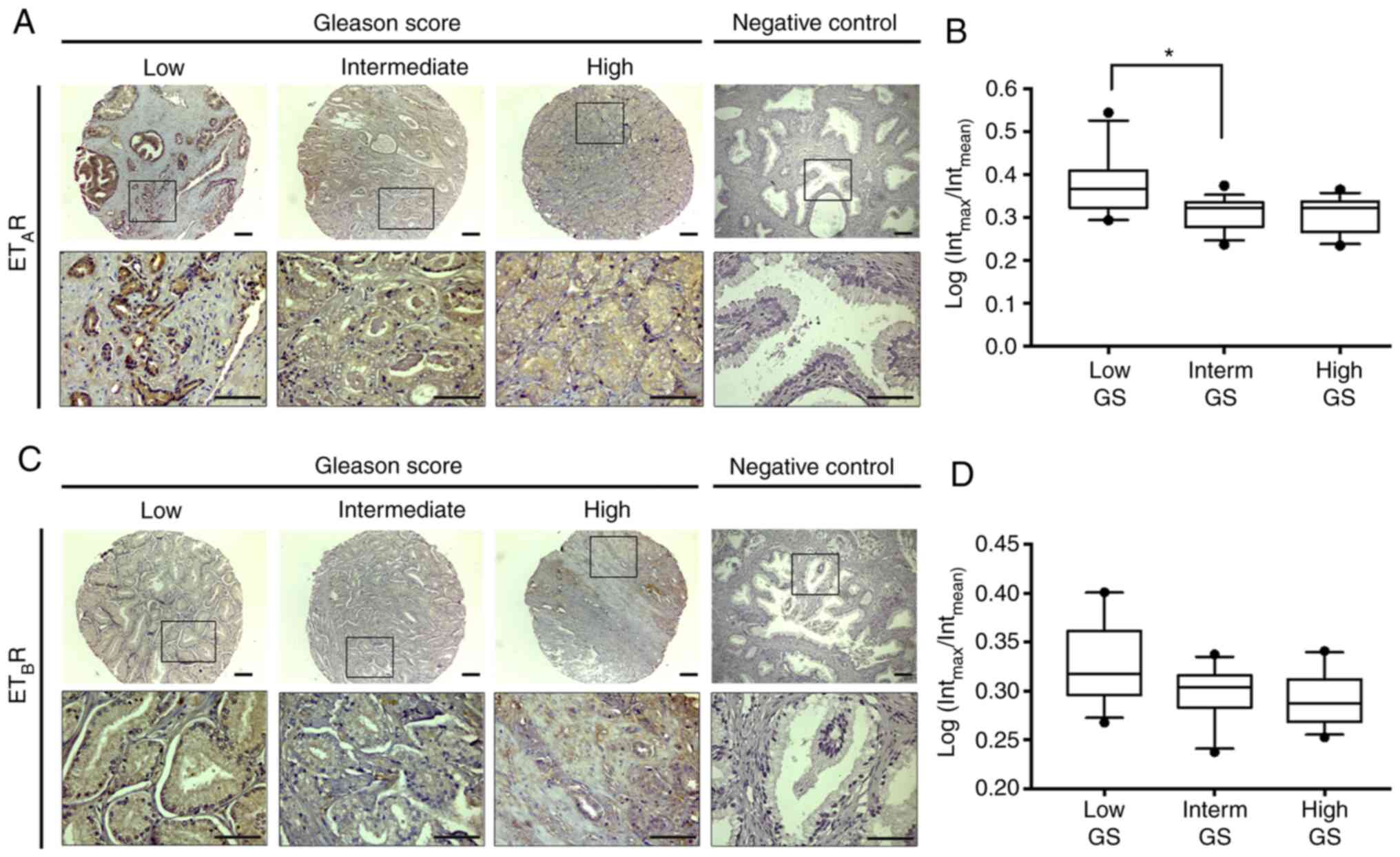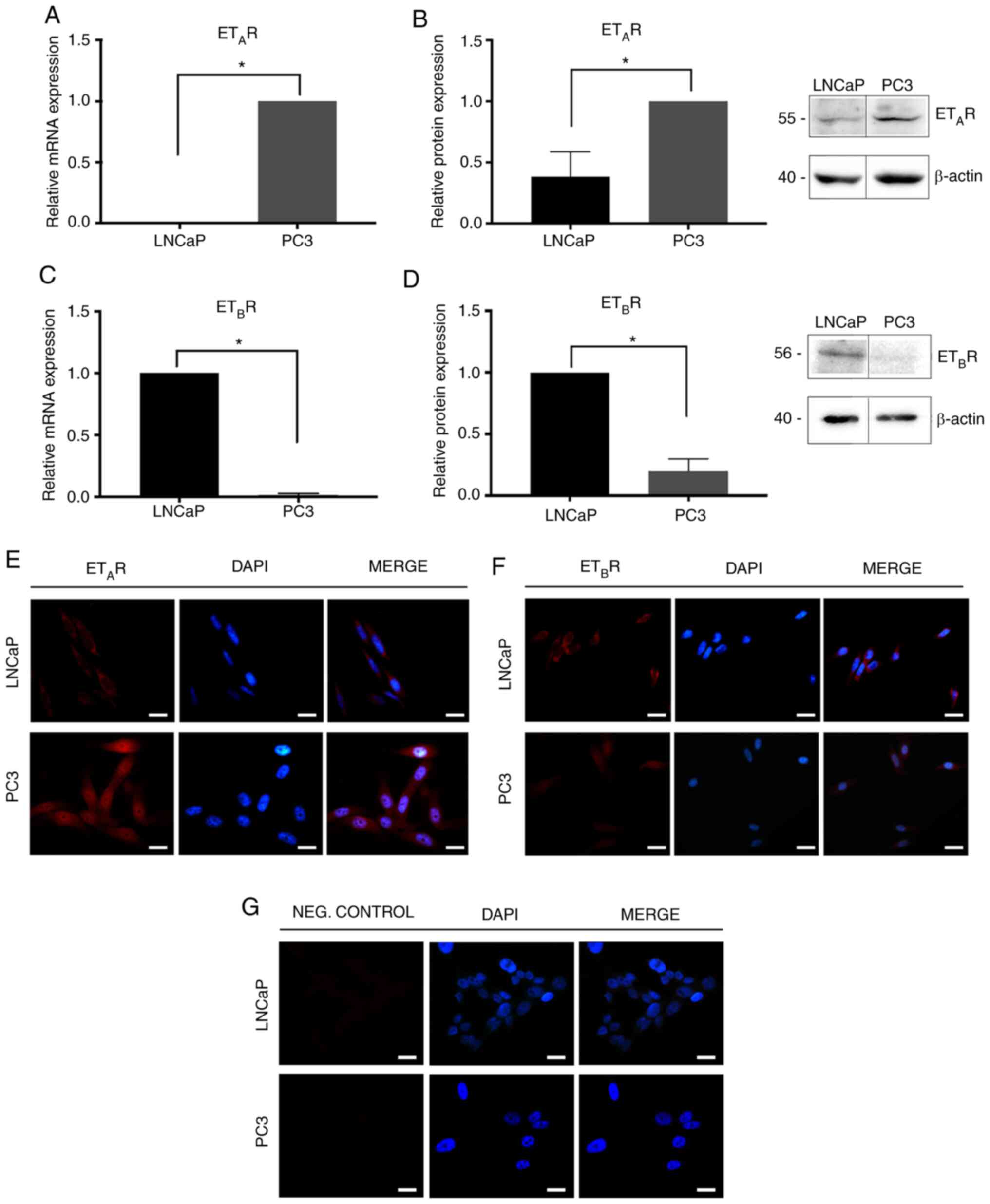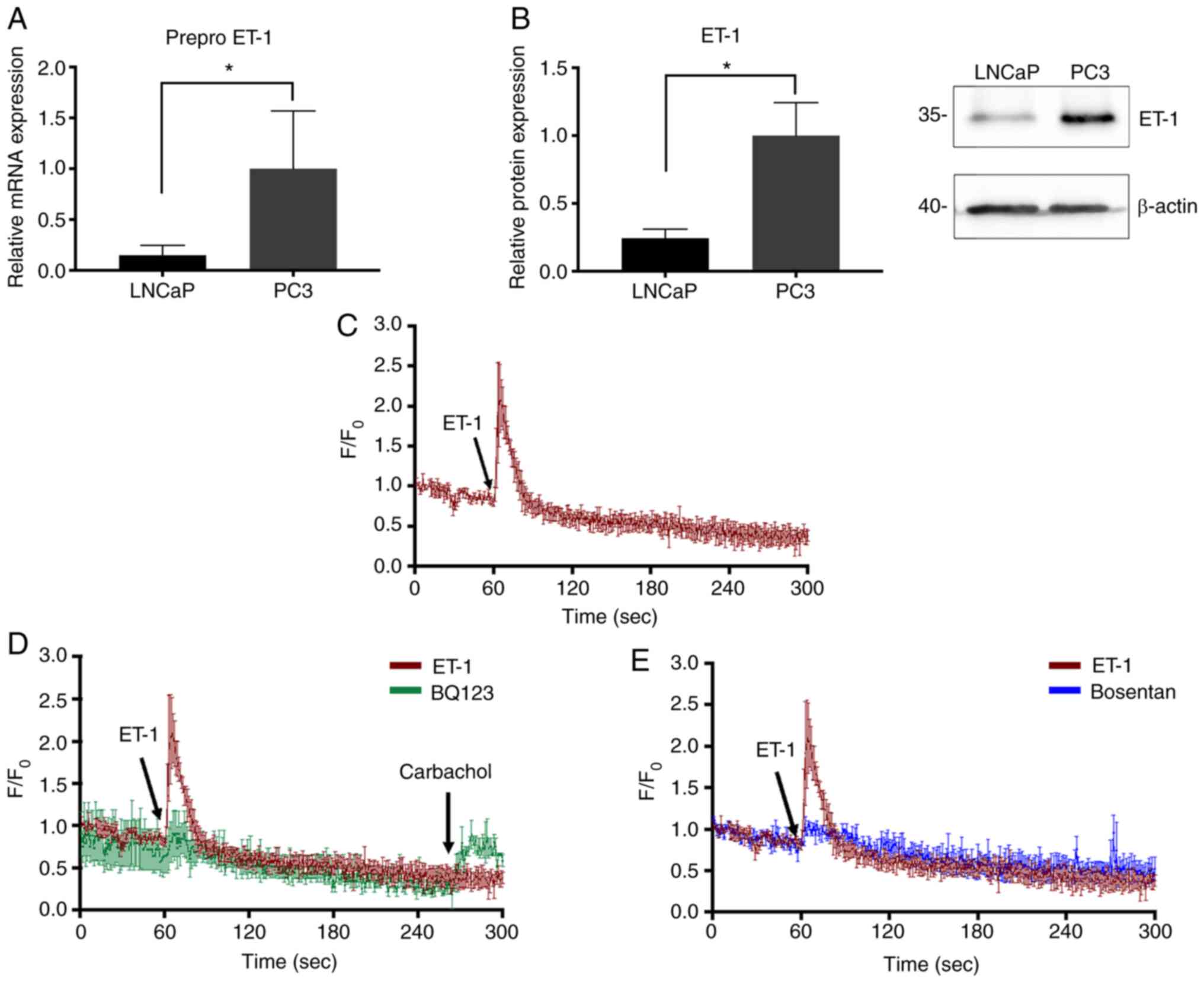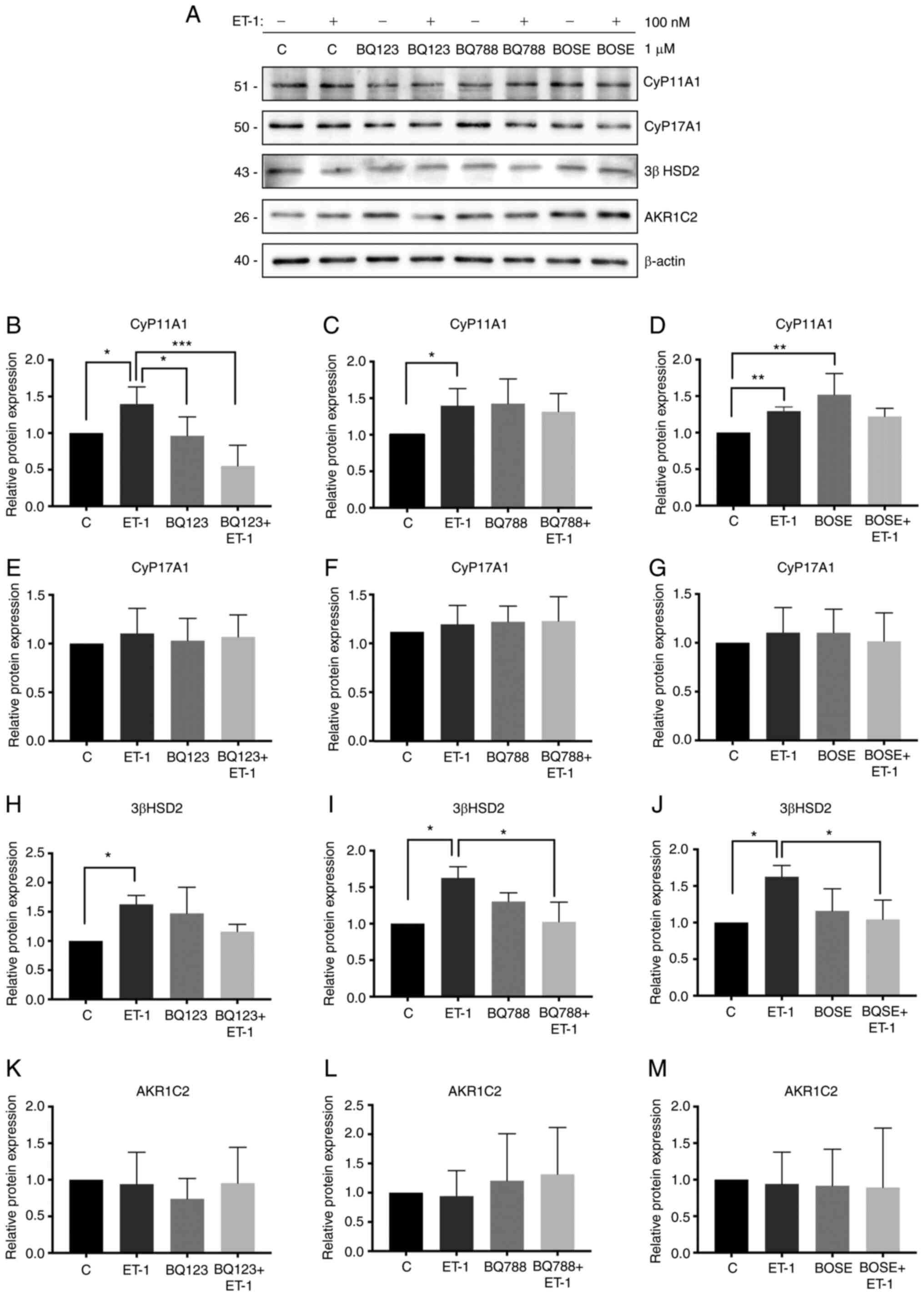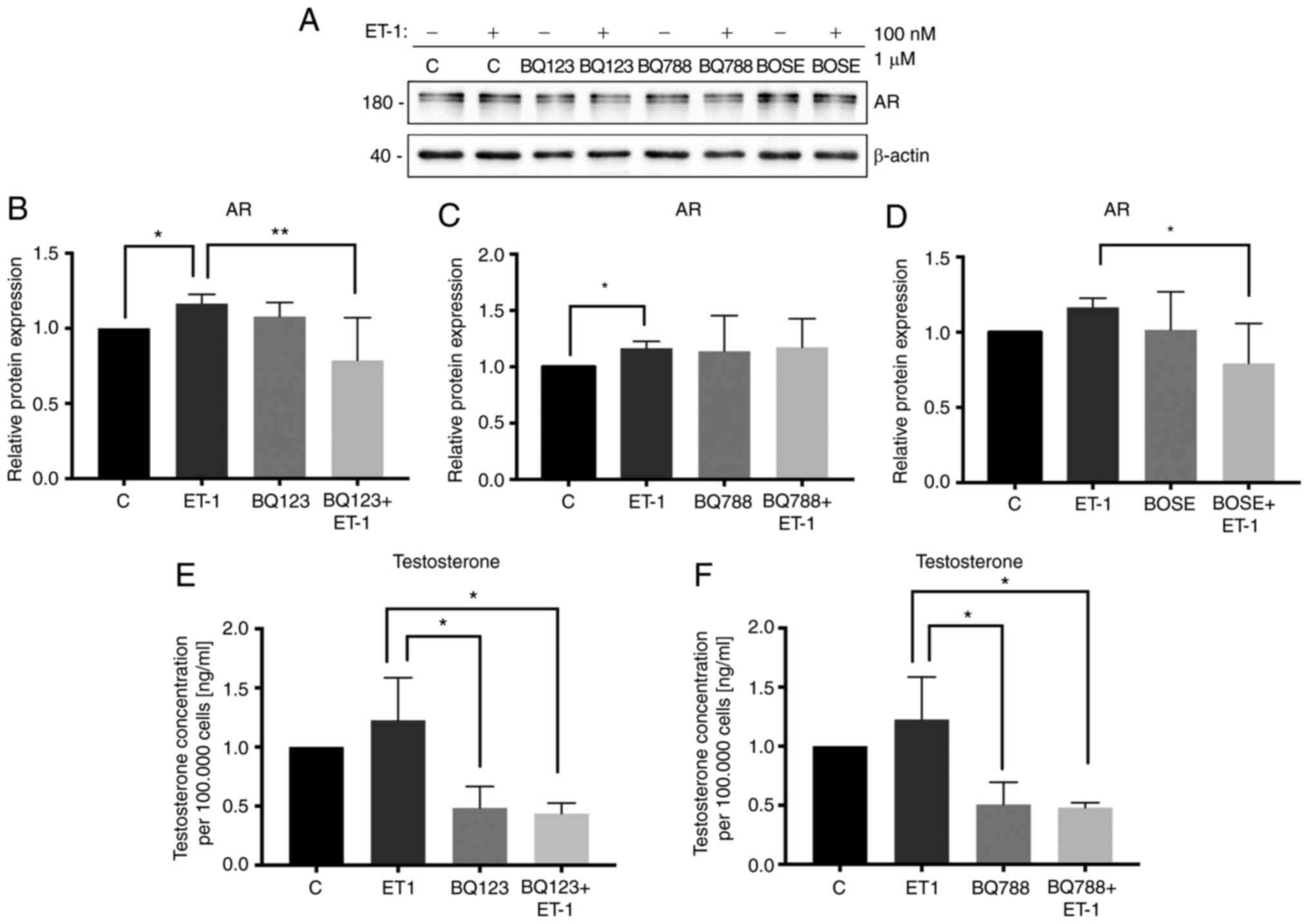|
1
|
Bray F, Ferlay J, Soerjomataram I, Siegel
RL, Torre LA and Jemal A: Global cancer statistics 2018: GLOBOCAN
estimates of incidence and mortality worldwide for 36 cancers in
185 countries. CA Cancer J Clin. 68:394–424. 2018. View Article : Google Scholar : PubMed/NCBI
|
|
2
|
Shah RB and Zhou M: Recent advances in
prostate cancer pathology: Gleason grading and beyond. Pathol Int.
66:260–272. 2016. View Article : Google Scholar : PubMed/NCBI
|
|
3
|
Shariat SF and Roehrborn CG: Using biopsy
to detect prostate cancer. Rev Urol. 10:262–280. 2008.PubMed/NCBI
|
|
4
|
Perlmutter MD and Lepor M: Androgen
deprivation therapy in the treatment of advanced prostate cancer.
Rev Urol. 9 (Suppl 1):S3–S8. 2007.PubMed/NCBI
|
|
5
|
Kaarbø M, Klokk TI and Saatcioglu F:
Androgen signaling and its interactions with other signaling
pathways in prostate cancer. Bioessays. 29:1227–1238. 2007.
View Article : Google Scholar
|
|
6
|
Anantharaman A and Friedlander TW:
Targeting the androgen receptor in metastatic castrate-resistant
prostate cancer: A review. Urol Oncol. 34:356–367. 2016. View Article : Google Scholar : PubMed/NCBI
|
|
7
|
Lonergan PE and Tindall DJ: Androgen
receptor signaling in prostate cancer development and progression.
J Carcinog. 10:202011. View Article : Google Scholar : PubMed/NCBI
|
|
8
|
Shore ND, Abrahamsson PA, Anderson J,
Crawford ED and Lange P: New considerations for ADT in advanced
prostate cancer and the emerging role of GnRH antagonists. Prostate
Cancer Prostatic Dis. 16:7–15. 2012. View Article : Google Scholar : PubMed/NCBI
|
|
9
|
Armandari I, Hamid AR, Verhaegh G and
Schalken J: Intratumoral steroidogenesis in castration-resistant
prostate cancer : A target for therapy. Prostate Int. 2:105–113.
2014. View Article : Google Scholar : PubMed/NCBI
|
|
10
|
Conte D, Questino P, Fillo S, Nordio M,
Isidori A and Romanelli F: Endothelin stimulates testosterone
secretion by rat leydig cells. J Endocrinol. 136:R1–R4. 1993.
View Article : Google Scholar : PubMed/NCBI
|
|
11
|
Stojilkovic SS: Endothelin receptors and
gonadal function: An invited commentary. Eur J Endocrinol.
135:391–393. 1996. View Article : Google Scholar : PubMed/NCBI
|
|
12
|
Ergün S, Harneit S, Paust HJ, Mukhopadhyay
AK and Holstein AF: Endothelin and endothelin receptors A and B in
the human testis. Anat Embryol (Berl). 199:207–214. 1999.
View Article : Google Scholar
|
|
13
|
Kopetz ES, Nelson JB and Carducci MA:
Endothelin-1 as a target for therapeutic intervention in prostate
cancer. Invest New Drugs. 20:173–182. 2002. View Article : Google Scholar : PubMed/NCBI
|
|
14
|
Grant K, Loizidou M and Taylor I:
Endothelin-1: A multifunctional molecule in cancer. Br J Cancer.
88:163–166. 2003. View Article : Google Scholar : PubMed/NCBI
|
|
15
|
Zonnenberg BA and Voest EE: The role of
endothelin in hormone-refractory prostate cancer. Eur Urol. (Suppl
2):9–14. 2003. View Article : Google Scholar
|
|
16
|
Montironi R, Mazzucchelli R, Barbisan F,
Stramazzotti D, Santinelli A, Lòpez Beltran A, Cheng L, Montorsi F
and Scarpelli M: Immunohistochemical expression of Endothelin-1 and
Endothelin-A and Endothelin-B receptors in high-grade prostatic
intraepithelial neoplasia and prostate cancer. Eur Urol.
52:1682–1690. 2007. View Article : Google Scholar : PubMed/NCBI
|
|
17
|
Niko B: Involvement of ion channels in
Endothelin-1-induced signalling in human prostate cancer cells. J
Clin Toxicol. 02:1–13. 2012.
|
|
18
|
Russell FD and Davenport AP: Secretory
pathways in endothelin synthesis. Br J Pharmacol. 126:391–398.
1999. View Article : Google Scholar : PubMed/NCBI
|
|
19
|
Barton M and Yanagisawa M: Endothelin: 20
years from discovery to therapy. Can J Physiol Pharmacol.
86:485–498. 2008. View Article : Google Scholar : PubMed/NCBI
|
|
20
|
Lee JG, Zheng R, McCafferty-Cepero JM,
Burnstein KL, Nanus DM and Shen R: Endothelin-1 enhances the
expression of the androgen receptor via activation of the c-myc
pathway in prostate cancer cells. Mol Carcinog. 48:141–149. 2009.
View Article : Google Scholar : PubMed/NCBI
|
|
21
|
Gleason DF: Histologic grading of prostate
cancer: A perspective. Hum Pathol. 23:273–279. 1992. View Article : Google Scholar : PubMed/NCBI
|
|
22
|
Baidoo E and Kontoh AK: Implementation of
gray level image transformation techniques. Int J Mod Educ Comput
Sci. 10:44–53. 2018. View Article : Google Scholar
|
|
23
|
Livak KJ and Schmittgen TD: Analysis of
relative gene expression data using real-time quantitative PCR and
the 2(-Delta Delta C(T)) method. Methods. 25:402–408. 2001.
View Article : Google Scholar : PubMed/NCBI
|
|
24
|
Whyteside AR, Hinsley EE, Lambert LA,
McDermott PJ and Turner AJ: ECE-1 influences prostate cancer cell
invasion via ET-1-mediated FAK phosphorylation and ET-1-independent
mechanisms. Can J Physiol Pharmacol. 88:850–854. 2010. View Article : Google Scholar : PubMed/NCBI
|
|
25
|
Papanikolaou S, Bravou V, Papadaki H and
Gyftopoulos K: The role of the endothelin axis in promoting
epithelial to mesenchymal transition and lymph node metastasis in
prostate adenocarcinoma. Urol Ann. 9:372–379. 2017. View Article : Google Scholar : PubMed/NCBI
|
|
26
|
D'Antonio JM, Ma C, Monzon FA and Pflug
BR: Longitudinal analysis of androgen deprivation of prostate
cancer cells identifies pathways to androgen independence.
Prostate. 68:698–714. 2008. View Article : Google Scholar
|
|
27
|
Godara G, Pecher S, Jukic DM, D'Antonio
JM, Akhavan A, Nelson JB and Pflug BR: Distinct patterns of
endothelin axis expression in primary prostate cancer. Urology.
70:209–215. 2007. View Article : Google Scholar : PubMed/NCBI
|
|
28
|
Gohji K, Kitazawa S, Tamada H, Katsuoka Y
and Nakajima M: Expression of endothelin receptor a associated with
prostate cancer progression. J Urol. 165:1033–1036. 2001.
View Article : Google Scholar : PubMed/NCBI
|
|
29
|
Nelson JB and Carducci MA: The role of
endothelin-1 and endothelin receptor antagonists in prostate
cancer. BJU Int. 85 (Suppl 2):S45–S48. 2000. View Article : Google Scholar : PubMed/NCBI
|
|
30
|
Liu J and Liu X: Knockdown of ET-1 gene
can inhibit the proliferation, invasion of human prostate cancer
cell. Biomed Res. 28:3377–3382. 2017.PubMed/NCBI
|
|
31
|
Miller WL: Steroidogenic enzymes. Endocr
Dev. 13:1–18. 2008. View Article : Google Scholar : PubMed/NCBI
|
|
32
|
Yazawa T, Imamichi Y, Sekiguchi T,
Miyamoto K, Uwada J, Khan MRI, Suzuki N, Umezawa A and Taniguchi T:
Transcriptional regulation of ovarian steroidogenic genes: Recent
findings obtained from stem cell-derived steroidogenic cells.
Biomed Res Int. 2019:89730762019. View Article : Google Scholar : PubMed/NCBI
|
|
33
|
Stocco DM, Wang XJ, Jo Y and Manna PR:
Multiple signaling pathways regulating steroidogenesis and
steroidogenic acute regulatory protein expression: More complicated
than we thought. Mol Endocrinol. 19:2647–2659. 2005. View Article : Google Scholar : PubMed/NCBI
|
|
34
|
Bennett NC, Hooper JD, Lambie D, Lee CS,
Yang T, Vesey DA, Samaratunga H, Johnson DW and Gobe GC: Evidence
for steroidogenic potential in human prostate cell lines and
tissues. Am J Pathol. 181:1078–1087. 2012. View Article : Google Scholar : PubMed/NCBI
|
|
35
|
Mostaghel EA, Solomon KR, Pelton K,
Freeman MR and Montgomery RB: Impact of circulating cholesterol
levels on growth and intratumoral androgen concentration of
prostate tumors. PLoS One. 7:e300622012. View Article : Google Scholar : PubMed/NCBI
|
|
36
|
Alimirah F, Chen J, Basrawala Z, Xin H and
Choubey D: DU-145 and PC-3 human prostate cancer cell lines express
androgen receptor: Implications for the androgen receptor functions
and regulation. FEBS Lett. 580:2294–2300. 2006. View Article : Google Scholar : PubMed/NCBI
|
|
37
|
Herrera D, Orellana-Serradell O, Villar P,
Torres MJ, Paciucci R, Castellón EA and Contreras HR: Silencing of
the transcriptional factor ZEB1 alters the steroidogenic pathway,
and increases the concentration of testosterone and DHT in DU145
cells. Oncol Rep. 41:1275–1283. 2019.PubMed/NCBI
|
|
38
|
van Bokhoven A, Varella-Garcia M, Korch C,
Johannes WU, Smith EE, Miller HL, Nordeen SK, Miller GJ and Lucia
MS: Molecular characterization of human prostate carcinoma cell
lines. Prostate. 57:205–225. 2003. View Article : Google Scholar : PubMed/NCBI
|
|
39
|
Ruggiero C and Lalli E: Impact of ACTH
signaling on transcriptional regulation of steroidogenic genes.
Front Endocrinol (Lausanne). 7:242016. View Article : Google Scholar : PubMed/NCBI
|
|
40
|
Bremer AA and Miller WL: Regulation of
steroidogenesis. Cell Endocrinol Heal Dis. 207–227. 2014.
View Article : Google Scholar
|















